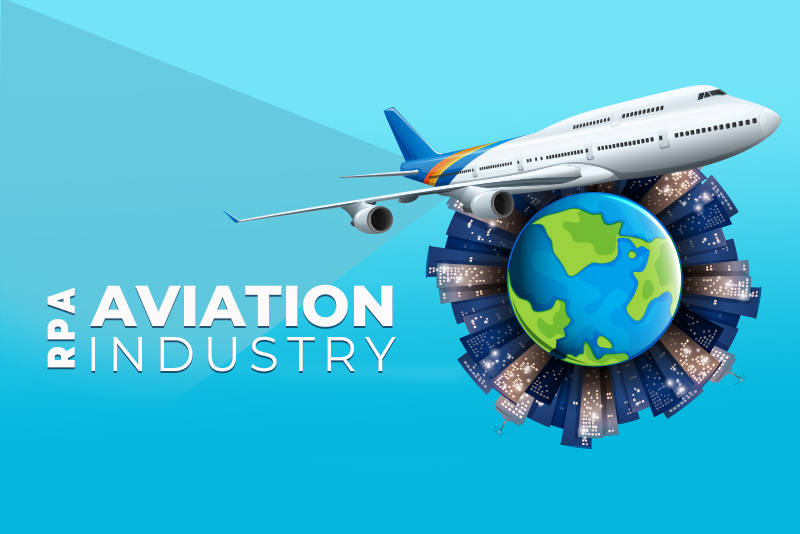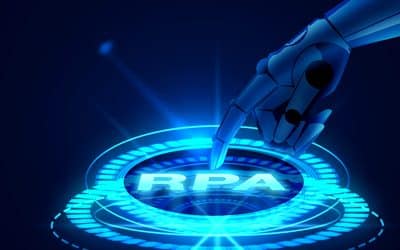An advanced and high-end technology that helps streamline high-volume, repetitive tasks and improve workflow, Robotic Process Automation (RPA) is transforming businesses like never before. RPA is a new technology that has shown significant potential in various industries and the aviation sector is no exception in this regard. Implementation of RPA in aviation is an obvious path towards greater business opportunities and optimization for the industry. It brings quality, speed, compliance and lowered costs. The industry is prepared for automation thanks to the never-ending flow of data that could be turned into actionable insights. With RPA tools, aviation businesses can make intelligent, data-driven decisions related to key areas such as airport administration, ticket sales, and aircraft navigation. Partnering with a robotic process automation company is the best way to implement innovative automation technologies that can take aviation businesses to the next level.
How Is RPA Technology Significant in the Aviation Industry?
A report from Gartner predicts that by 2022, 90 percent of companies will have resorted to RPA to digitally empower critical business processes. The worldwide RPA software revenue is expected to reach 1.900 million US dollars this year, which means a growth of 19.53 percent compared to 2020. RPA can be useful to carry out or remove repetitive, time-consuming activities involved in the processes. For instance, flight ticket cancelations and reservations management, providing refunds; generating tickets before boarding, and more. This will allow the airline service to attract more customers by giving them an enjoyable experience.
The sheer volume of data being generated into airline processing centers in multiple formats and in varying time frames presents a logistics exercise even before the hard work of dealing with and reconciling the data begins. In addition, there are other concerns regarding the quality of data reported in a manual form. Such manual reports and input data can be incomplete, use different definitions / interpretations or formatting, and can easily involve erroneous entries. RPA streamlines and automates rule-based business processes and activities. By leveraging complex technologies such as Machine Learning, Artificial Intelligence, Optical Character Recognition (OCR) and Text Analytics, RPA can effectively perform high volume tasks, improve the experience of users and customers and make workflows more efficient.
A potential game-changer for aviation, Robotic Process Automation (RPA) provides the opportunity to save costs, improve service and focus on higher value work. In addition, the technology can be utilized for regulatory compliance. Various airlines are governed by separate boards, so compliance with the rules can also be difficult. RPA ensures high performance in process accuracy and enables businesses to comply quickly and effectively.
Use Cases of RPA in the Aviation Industry
In simple terms, robotic process automation (RPA) in the aviation industry involves usage of software bots to automate the functioning of different areas, such as airport administration, ticket sales, quality assurance, customer relations, aircraft navigation, air traffic control, and more. After having discussed the significance of RPA across the industry spectrum, let’s now focus on airline process automation. This is very important, since the airline sector was one of the top industries that got heavily impacted by the pandemic. Here discussed are some top RPA use cases in aviation –
- Data Management – Software robots can be utilized to search for missing input data and identify the relevant data bits in other airline applications. Additionally, it can also perform necessary checks in resilience ranges. In another scenario, bots can determine the right data value if the exchange of coupon numbers was not correctly reported. These bots can then analyze and compare the documents and decide when those need to be reissued. The appropriate data records can then update or approve specific process steps.
- Invoicing – Airlines companies partner with several international travel agencies to sell airline tickets. So the list of invoices they receive comes from all over the world and in various formats. Processing all these manually takes time, effort, and is subject to manual errors. Airlines can leverage RPA in their invoice processing to automate the receivables, approval, and logging of the invoices. Furthermore, they can program the bot to reformat the data if it comes in an unstructured or atypical way.
- Cabin Crew Scheduling – Efficient cabin crew scheduling can be challenging for airline companies. This is primarily because airlines should select and assign trips to cabin crew based on their employees’ contracts, union stipulations, safety regulations, the date and time of their last flight, their availability, experience, and more. Bots can be used to schedule and assign tasks and to effectively handle responsibility demands among the team. Adopting automated scheduling software bots that can connect with human resources ERP systems can help extract employee information. These include contract information, time schedule, and other stipulations which can be used to automatically select the most suitable cabin crew pairings for the next flight. This will help avoid scheduling mishaps and ensure regulatory compliance. Also, these bots can effectively handle automation of the notification messages that enable crew members to be informed of any changes efficiently.
- Customer Relations – With delayed flights, cramped seats, lost baggages and unruly fellow passengers, there is no limit to the number of complaints that airlines receive. Reports suggest that in 2020 alone, US airlines received 102,550 complaints, a 568 percent increase from 2019. Sorting, categorizing, and addressing all these complaints in varying formats, length, and degree of importance can be a challenging task. Airlines can leverage NLP, OCR, and RPA technologies to allow bots to read the complaints, assess the degree of importance, understand the category that they fall into, and automatically send them to the customer relations staff’s email for them to take action.
- Air Traffic Control – Poor air traffic control (ATC) not only causes delays and ignites the fury of passengers, but also induces economical costs. Automating flight schedules by exchanging real-time status data between the aircrafts on the ground and on the sky, ATC, the weather stations, fuelling stations, flight engineers, and other parties through RPA and OLDI (online data interchange) can reduce delays, make schedules more on-time, and reduce the workload of the staff.
- Updating Travelers – The airline department teams need to provide information on flight timings, flight cancel and booking status to the travelers. As manually performing these tasks can cause delays in processing, RPA can be deployed to perform the necessary steps quickly in keeping the travelers informed about the situation. RPA robots and Chatbot solutions can be deployed to answer traveller queries with respect to flight schedules and booking status – thereby offering the right response and making them satisfied with the services provided by the airline company.
- Recovery of Outdated System Files – Typically, manual file extraction is done by employees or by the developer to modify the system. Both are time-consuming and costly. Deploying software robots can help perform these tasks much better, faster and more accurately. This also ensures that all files in the system are downloaded in due time, and moved to the new system. Therefore, RPA can replace obsolete and inefficient IT systems which limit development and innovation. With minimum assistance, RPA makes it possible to utilize human labor better for higher value-added tasks.
- Identifying Revenue Leakage – Plugging revenue leaks requires that the airline company be synchronized with the travel agencies. RPA in the airline can be used to streamline synchronization by detecting errors faster and encompassing all synchronized elements. This provides more additional insights and enhances the chances of taking suitable decisions with respect to revenue recovery and protection. In short, recovering lost revenue and curbing leakages via automation leads to considerable savings for the airline company.
- Automated Check-ins – Automated check-ins via kiosks is perhaps the most tangible automation use case in airports that travelers are familiar with. Even though human staff is still present behind the counters for checking in travelers and giving them their boarding passes, these kiosks are viable alternatives. With RPA technology, travelers can scan their passport’s barcode, the software automatically retrieves their passport number, name, and surname and cross checks it with their flight reservation. The software automatically books them a vacant seat on the flight and prints out their boarding pass, exhibiting all the relevant information on it.
- Ticket Sales – The ticket sales process could be automated by RPA bots so that travelers can enter their information on the website without the need to interact with a live-agent via online chat. The RPA solution would then automatically issue an e-ticket and send it to the traveler’s email, with a scannable code. The benefit of automated ticket sales is that sales representatives can spend their time addressing more important issues.
Read our blog post: 8 RPA Applications in the Aviation Industry
The aviation industry is facing stiff competition with the rapid changes in customer needs. Airline process automation is a technological solution that makes people really matter, empowering both employees and customers. Automation of repetitive tasks requires staff deployment only for the final checks. This gives the employees more time and energy to engage in more sophisticated and strategic work thereby providing higher-value customer service. In fact, large aviation companies have integrated RPA with the assistance of business process outsourcing services in almost all business operations to achieve greater organizational performance and efficiency, increased profits, improved compliance and reduced customer dropouts.
Combining advanced technology and manpower, MOS provides advanced RPA services that anyone can use with ease. We can provide you with end-to-end process virtualization, making business operations responsive, accurate, and cost-effective.




